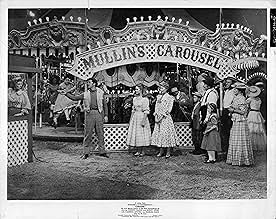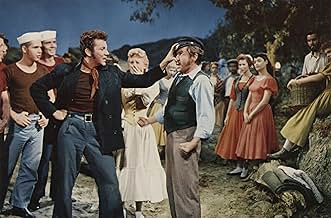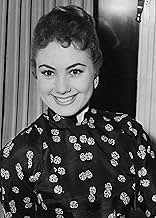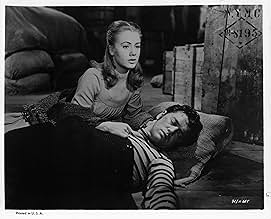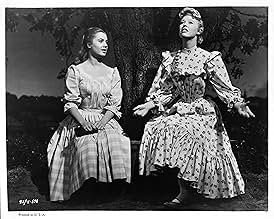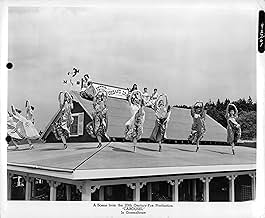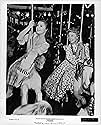IMDb RATING
6.5/10
7.1K
YOUR RATING
Fifteen years after his death, a carousel barker is granted permission to return to Earth for one day to make amends to his widow and their daughter.Fifteen years after his death, a carousel barker is granted permission to return to Earth for one day to make amends to his widow and their daughter.Fifteen years after his death, a carousel barker is granted permission to return to Earth for one day to make amends to his widow and their daughter.
- Awards
- 1 win & 3 nominations total
William LeMassena
- Heavenly Friend
- (as William Le Massena)
Jacques d'Amboise
- Louise's 'Starlight Carnival' Dancing Partner
- (as Jacques D'Amboise)
Walter Bacon
- Graduation Spectator
- (uncredited)
Robert Banas
- Ruffian in Louise's Ballet
- (uncredited)
Tex Brodus
- Townsman
- (uncredited)
Buddy Bryan
- Dancer
- (uncredited)
Bob Calder
- Dancer
- (uncredited)
Harry Carter
- Third Policeman
- (uncredited)
Featured reviews
The dark, brooding Rodgers & Hammerstein stage musical gets the big-budget screen treatment in this 1956 release, and the results are only moderately successful. The actors have great voices -- and certainly the score to "Carousel" is the lushest and densest R&H produced -- but they're simply not good enough actors to explore the depths of the musical's book. Gordon MacRae and Shirley Jones were fine as perky country folk in "Oklahoma!" from a year earlier, but MacRae is not a dangerous enough presence to pull off the rough character of Billy Bigelow.
Still, as mentioned, the score sounds wonderful and remains mostly intact for the film. And Agnes DeMille provides some characteristically stunning screen choreography, especially in the trademark R&H ballet sequence.
Grade: B
Still, as mentioned, the score sounds wonderful and remains mostly intact for the film. And Agnes DeMille provides some characteristically stunning screen choreography, especially in the trademark R&H ballet sequence.
Grade: B
Shirley Jones is very believable as Julie Jordan, the lovely and ever patient mill worker who falls for a carousel barker, Billy Bigelow. With such heart felt ballads as "If I Loved You" and "You'll Never Walk Alone" it definitely ranks as one of the essential Hollywood musicals. Carousel is just about the only musical made during this period that deals with darker themes (i.e. date rape, domestic abuse). One could say that it even argues in favor of birth control. Carousel will never look dated because its themes are timeless and apply to the human spirit no matter what year it is. Everybody can identify with Billy to a degree and everybody can not help but feel a deep respect for Julie by the end of her personal journey. Fans of musical drama will treasure Carousel for years to come.
"Carousel" is the musical version of the old film "Liliom"--a story that was filmed many times since 1919. While I've not seen either silent version, I have seen the Frank Borzage version (1930) and the French language version by Fritz Lang (1934). I wasn't impressed by either of these films--mostly because the leading character was pretty despicable. He's a very selfish character who horribly mistreats his poor wife--and I wonder how they can make this a romance with such a horrible guy, as it severely undermines the story. So, "Carousel" begins with a major handicap, as hating the leading character makes it hard to fall in love with the film.
The film begins in New England. A very impressionable young lady (Shirley Jones) sees a handsome rogue (Gordon MacRae) at the carnival and the two inexplicably fall in love and decide to marry. I say inexplicably because he is a real womanizer and NOT the type to ever settle down. As for the marriage, it is a disaster--mostly because he is a ne'er-do'-well who is afraid to work or commit himself to his lovely wife. At times, such as when he learns he's about to become a father, he commits to changing but invariably he ends up returning to his old ways. Now I was a bit uncomfortable about this, as he apparently slapped his bride around--but they made LOTS of excuses for it, such as saying 'he's under a lot of pressure' or 'I only hit her once'! So much for a film that will empower the women in the audience! I just couldn't get past the fact he was a jerk who died while trying to rob someone!
This story is apparently all part of some flashback. You see, MacRae's character is dead and he's telling this to the head honcho up in Heaven because he wants permission to return for one and only one brief period. Now considering most of the flashback consists of him acting like a clod, you wonder how this is all going to convince the powers that be to grant his request!
As for the music, it's decent but the film clearly lacks the crowd-pleasing tunes of many of Rogers and Hammerstein's other works. "South Pacific", "Oklahoma" and the rest had more memorable songs--and didn't have to work so hard to compensate for an unlikable lead. Here, it's an uphill battle. Pretty, well made...but still a film that I had a hard time liking. Overall, it looks good but fails. Watchable but among the least in the Rogers and Hammerstein canon.
The film begins in New England. A very impressionable young lady (Shirley Jones) sees a handsome rogue (Gordon MacRae) at the carnival and the two inexplicably fall in love and decide to marry. I say inexplicably because he is a real womanizer and NOT the type to ever settle down. As for the marriage, it is a disaster--mostly because he is a ne'er-do'-well who is afraid to work or commit himself to his lovely wife. At times, such as when he learns he's about to become a father, he commits to changing but invariably he ends up returning to his old ways. Now I was a bit uncomfortable about this, as he apparently slapped his bride around--but they made LOTS of excuses for it, such as saying 'he's under a lot of pressure' or 'I only hit her once'! So much for a film that will empower the women in the audience! I just couldn't get past the fact he was a jerk who died while trying to rob someone!
This story is apparently all part of some flashback. You see, MacRae's character is dead and he's telling this to the head honcho up in Heaven because he wants permission to return for one and only one brief period. Now considering most of the flashback consists of him acting like a clod, you wonder how this is all going to convince the powers that be to grant his request!
As for the music, it's decent but the film clearly lacks the crowd-pleasing tunes of many of Rogers and Hammerstein's other works. "South Pacific", "Oklahoma" and the rest had more memorable songs--and didn't have to work so hard to compensate for an unlikable lead. Here, it's an uphill battle. Pretty, well made...but still a film that I had a hard time liking. Overall, it looks good but fails. Watchable but among the least in the Rogers and Hammerstein canon.
I saw Carousel for the very first time in its first release when it played a double bill with Oklahoma. You can't do much better than that for an introduction to the American Musical Theater.
It would get a perfect 10 had it been done with the original two leads that were set for the show, Frank Sinatra and Judy Garland. Judy backed out before production started and Sinatra shortly after that, so Gordon MacRae and Shirley Jones got to do a second Rodgers&Hammerstein classic.
Carousel is based on the Ferenc Molnar play Liliom and the original setting is in Molnar's native Hungary. On Broadway it was done by Eva Le Gallienne and Joseph Schildkraut and later in revival by Ingrid Bergman and Burgess Meredith. One man who did it in summer stock was Tyrone Power who if a straight dramatic version of Liliom had ever been done, would have been perfect.
Whether he's Liliom in Hungary or Billy Bigelow in 19th century New England, the part is one for a hero/heel that Tyrone Power patented on the screen. Probably Gordon MacRae benefited in no small way in having Power's favorite director Henry King in charge of Carousel.
Richard Rodgers was also used to writing for a hero/heel having done Pal Joey with his former partner Lorenz Hart. Billy is that kind of guy, a carousel barker and boy toy to owner Audrey Christie when he spots Julie Jordan and her friend Carrie Pipperidge, a couple of mill workers. It's love at first sight and marriage shortly after, but Billy's not a guy to change his layabout ways and it ends in tragedy.
One reason that Sinatra was also so right for the part was that he had made a successful hit record of Billy's Soliliquy back in 1945 when Carousel debuted on Broadway. It was a groundbreaking piece of musical theater that Dick Rodgers and Oscar Hammerstein were responsible for in the Soliliquy. Billy's just been told by Julie he's about to become a father. In an almost 10 minute number he bares his soul to the audience and sings/thinks aloud the moves he's going to make. The song is almost operatic in quality, it takes a real singing actor to put it over like Sinatra, like MacRae is here, like John Raitt in the original cast on stage.
Though it's not Julie's song, Judy Garland had a successful record with You'll Never Walk Alone. I'm sure she would have sung it in the film had she seen it through. It's probably the big hit song from the score, still an inspiring number today.
Rounding out the cast is Cameron Mitchell as Billy's no good pal Jigger, Robert Rounseville and Barbara Ruick as Mr. Snow and Carrie, the second leads and from the Metropolitan Opera Claramae Turner as Julie's cousin Nettie who does sing You'll Never Walk Alone.
Two more who are perfectly cast are John Dehner as the officious mill owner that employs the girls and the heavenly star-keeper, Gene Lockhart in one of his last roles.
Even more than in Oklahoma, Agnes DeMille's ballet numbers are used to advance the plot. From the exuberant June Is Busting Out All Over to the dance that Billy and Julie's daughter does, all are done with taste and style.
Carousel is both tragic and yet uplifting and inspiring. It's a musical for all the ages to come.
It would get a perfect 10 had it been done with the original two leads that were set for the show, Frank Sinatra and Judy Garland. Judy backed out before production started and Sinatra shortly after that, so Gordon MacRae and Shirley Jones got to do a second Rodgers&Hammerstein classic.
Carousel is based on the Ferenc Molnar play Liliom and the original setting is in Molnar's native Hungary. On Broadway it was done by Eva Le Gallienne and Joseph Schildkraut and later in revival by Ingrid Bergman and Burgess Meredith. One man who did it in summer stock was Tyrone Power who if a straight dramatic version of Liliom had ever been done, would have been perfect.
Whether he's Liliom in Hungary or Billy Bigelow in 19th century New England, the part is one for a hero/heel that Tyrone Power patented on the screen. Probably Gordon MacRae benefited in no small way in having Power's favorite director Henry King in charge of Carousel.
Richard Rodgers was also used to writing for a hero/heel having done Pal Joey with his former partner Lorenz Hart. Billy is that kind of guy, a carousel barker and boy toy to owner Audrey Christie when he spots Julie Jordan and her friend Carrie Pipperidge, a couple of mill workers. It's love at first sight and marriage shortly after, but Billy's not a guy to change his layabout ways and it ends in tragedy.
One reason that Sinatra was also so right for the part was that he had made a successful hit record of Billy's Soliliquy back in 1945 when Carousel debuted on Broadway. It was a groundbreaking piece of musical theater that Dick Rodgers and Oscar Hammerstein were responsible for in the Soliliquy. Billy's just been told by Julie he's about to become a father. In an almost 10 minute number he bares his soul to the audience and sings/thinks aloud the moves he's going to make. The song is almost operatic in quality, it takes a real singing actor to put it over like Sinatra, like MacRae is here, like John Raitt in the original cast on stage.
Though it's not Julie's song, Judy Garland had a successful record with You'll Never Walk Alone. I'm sure she would have sung it in the film had she seen it through. It's probably the big hit song from the score, still an inspiring number today.
Rounding out the cast is Cameron Mitchell as Billy's no good pal Jigger, Robert Rounseville and Barbara Ruick as Mr. Snow and Carrie, the second leads and from the Metropolitan Opera Claramae Turner as Julie's cousin Nettie who does sing You'll Never Walk Alone.
Two more who are perfectly cast are John Dehner as the officious mill owner that employs the girls and the heavenly star-keeper, Gene Lockhart in one of his last roles.
Even more than in Oklahoma, Agnes DeMille's ballet numbers are used to advance the plot. From the exuberant June Is Busting Out All Over to the dance that Billy and Julie's daughter does, all are done with taste and style.
Carousel is both tragic and yet uplifting and inspiring. It's a musical for all the ages to come.
In recent years it has become commonplace to site Frank Kapra's `It's a Wonderful Life' as one of the greatest films ever. It has become a Christmas tradition. I feel that film is overrated. The problem I have with it is that it stacks the deck in trying to convince us of the value of human life. George Bailey is a successful banker- not exactly rich but successful enough that he contributed a lot of material things to people's lives, including a housing development named after him. He also saved his brother's life so his brother could save the men on that ship, etc. etc. The message is that you are of value if you have done the sort of things they build statues of people to honor. On top of that, without George, everybody in this town is nothing. They are all drunks or crooks or prostitutes. They have no capabilities of their own. They are all dependent on George Bailey.
I much prefer Carousel, whose hero is a bum. If you were to ask nearly everybody in town- a town that has done just fine without him, as a matter of fact, what Billy Bigelow contributed to their lives, they would say nothing- if they remembered him at all. The only people who would have anything good to say about him are those that he loved and who loved him. And that is the bottom line. If a person can be redeemed by his ability to love and to inspire love in others, we all have a chance. If you have to have a bank and town named after you, the bar is too high for most of us.
As a musical, this is as good as it gets. `If I loved you' is rivaled only by `Some Enchanted Evening' as a love song and it means more as it's revealing of the character of this crude man who can't express what's in his soul and this shy girl who wants only to love and be loved. `Soliloquy' is the dramatic highlight in the history of the musical as Billy works out all his hopes and dreams in his mind and vows to do anything he can to make his daughter's life special. By over reaching his bounds, he does the opposite. `What's the Use of Wondering' expresses the doubts anyone entering a relationship has and is doubly moving as it's sung by Julie, for whom we know the song will have special relevance. `When You Walk Through a Storm' offers hope to us all. Those old guys at graduations are really worth listening to.
I much prefer Carousel, whose hero is a bum. If you were to ask nearly everybody in town- a town that has done just fine without him, as a matter of fact, what Billy Bigelow contributed to their lives, they would say nothing- if they remembered him at all. The only people who would have anything good to say about him are those that he loved and who loved him. And that is the bottom line. If a person can be redeemed by his ability to love and to inspire love in others, we all have a chance. If you have to have a bank and town named after you, the bar is too high for most of us.
As a musical, this is as good as it gets. `If I loved you' is rivaled only by `Some Enchanted Evening' as a love song and it means more as it's revealing of the character of this crude man who can't express what's in his soul and this shy girl who wants only to love and be loved. `Soliloquy' is the dramatic highlight in the history of the musical as Billy works out all his hopes and dreams in his mind and vows to do anything he can to make his daughter's life special. By over reaching his bounds, he does the opposite. `What's the Use of Wondering' expresses the doubts anyone entering a relationship has and is doubly moving as it's sung by Julie, for whom we know the song will have special relevance. `When You Walk Through a Storm' offers hope to us all. Those old guys at graduations are really worth listening to.
Did you know
- TriviaThe film was not successful at the box office despite the positive reviews, but the soundtrack album became a national best seller.
- Goofs(at around 59 mins) Billy Bigelow (Gordon MacRae) sings the "My Boy Bill" soliloquy on the beach. One minute and 17 seconds into the song, four jets fly over in formation in the upper left of the frame. This scene was filmed on the beach near Paradise Cove, Malibu, California, in 1955, when there were several operating Navy and Marine military bases in southern California.
- Crazy creditsA star hurtles downward and explodes in mid-air; out of this appears the credit "Twentieth Century-Fox presents Rodgers and Hammerstein's Carousel". The other credits all appear in a straightforward fashion.
- Alternate versionsIn the film's first two telecasts on ABC-TV in 1966, Mrs. Mullin's line "I don't run my business for a lot of sluts." followed by Carrie's retort "Who you calling a slut? Slut yourself!" and Julie says "Yeah, slut yourself!" was edited out. The line was kept on all local station telecasts of the film, and on all video releases.
- ConnectionsFeatured in King of the Movies (1978)
- SoundtracksThe Carousel Waltz
(1945) (uncredited)
Music by Richard Rodgers
Performed by the 20th Century-Fox Studio Orchestra Conducted by Alfred Newman
Details
- Release date
- Country of origin
- Language
- Also known as
- Rodgers and Hammerstein's Carousel
- Filming locations
- Boothbay Harbor, Maine, USA(scenes outside Nettie's Spa and in marina, including musical numbers "June Is Bustin' Out All Over" and "When The Children Are Asleep")
- Production company
- See more company credits at IMDbPro
Box office
- Gross worldwide
- $1,104
- Runtime
- 2h 8m(128 min)
- Color
- Aspect ratio
- 2.55 : 1
Contribute to this page
Suggest an edit or add missing content




